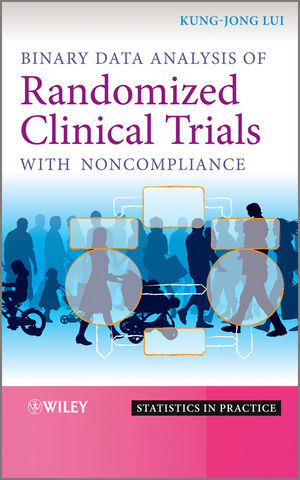
Binary Data Analysis of Randomized Clinical Trials with Noncompliance
John Wiley & Sons Inc (Verlag)
9780470660959 (ISBN)
- Titel z.Zt. nicht lieferbar
- Versandkostenfrei
- Auch auf Rechnung
- Artikel merken
It is quite common in a randomized clinical trial (RCT) to encounter patients who do not comply with their assigned treatment. Since noncompliance often occurs non-randomly, the commonly-used approaches, including both the as-treated (AT) and as-protocol (AP) analysis, and the intent-to-treat (ITT) (or as-randomized) analysis, are all well known to possibly produce a biased inference of the treatment efficacy. This book provides a systematic and organized approach to analyzing data for RCTs with noncompliance under the most frequently-encountered situations. These include parallel sampling, stratified sampling, cluster sampling, parallel sampling with subsequent missing outcomes, and a series of dependent Bernoulli sampling for repeated measurements. The author provides a comprehensive approach by using contingency tables to illustrate the latent probability structure of observed data. Using real-life examples, computer-simulated data and exercises in each chapter, the book illustrates the underlying theory in an accessible, and easy to understand way.
Key features:
Consort-flow diagrams and numerical examples are used to illustrate the bias of commonly used approaches, such as, AT analysis, AP analysis and ITT analysis for a RCT with noncompliance.
Real-life examples are used throughout the book to explain the practical usefulness of test procedures and estimators.
Each chapter is self-contained, allowing the book to be used as a reference source.
Includes SAS programs which can be easily modified in calculating the required sample size.
Biostatisticians, clinicians, researchers and data analysts working in pharmaceutical industries will benefit from this book. This text can also be used as supplemental material for a course focusing on clinical statistics or experimental trials in epidemiology, psychology and sociology.
Kung-Jong Lui, Department of Mathematics and Statistics, San Diego State University, USA.
Preface. A bout the author. 1 Randomized clinical trials with noncompliance: issues, definitions and problems of commonly used analyses.
1.1 Randomized encouragement design (RED).
1.2 Randomized consent designs.
1.3 Treatment efficacy versus programmatic effectiveness.
1.4 Definitions of commonly used terms and assumptions.
1.5 Mmost commonly used analyses for a RCT with noncompliance.
Exercises.
2 Randomized clinical trials with noncompliance under parallel groups design.
2.1 Testing superiority.
2.2 Testing noninferiority.
2.3 Testing equivalence.
2.4 Interval estimation.
2.5 Sample size determination.
2.6 Risk model-based approach.
Exercises.
Appendix.
3 Randomized clinical trials with noncompliance in stratified sampling.
3.1 Testing superiority.
3.2 Testing noninferiority.
3.3 Testing equivalence .
3.4 Interval estimation.
3.5 Test homogeneity of index in large strata.
Exercises.
Appendix.
4 Randomized clinical trials with noncompliance under cluster sampling.
4.1 Testing superiority.
4.2 Testing noninferiority.
4.3 Testing equivalence.
4.4 Interval estimation.
4.5 Sample size determination.
4.6 An alternative randomization-based approach.
Exercises.
Appendix.
5 Randomized clinical trials with both noncompliance and subsequent missing outcomes.
5.1 Testing superiority.
5.2 Testing noninferiority.
5.3 Testing equivalence.
5.4 Interval estimation.
5.5 Sample size determination.
5.6 An alternative missing at random (MAR) model.
Exercises.
Appendix.
6 Randomized clinical trials with noncompliance in repeated binary measurements.
6.1 Testing superiority.
6.2 Testing noninferiority.
6.3 Testing equivalence.
6.4 Interval estimation.
6.5 Sample size determination.
Exercises.
References.
Index.
| Erscheint lt. Verlag | 25.4.2011 |
|---|---|
| Reihe/Serie | Statistics in Practice |
| Verlagsort | New York |
| Sprache | englisch |
| Maße | 159 x 235 mm |
| Gewicht | 626 g |
| Themenwelt | Mathematik / Informatik ► Mathematik ► Wahrscheinlichkeit / Kombinatorik |
| Medizin / Pharmazie ► Medizinische Fachgebiete | |
| Studium ► Querschnittsbereiche ► Epidemiologie / Med. Biometrie | |
| ISBN-13 | 9780470660959 / 9780470660959 |
| Zustand | Neuware |
| Informationen gemäß Produktsicherheitsverordnung (GPSR) | |
| Haben Sie eine Frage zum Produkt? |
aus dem Bereich


